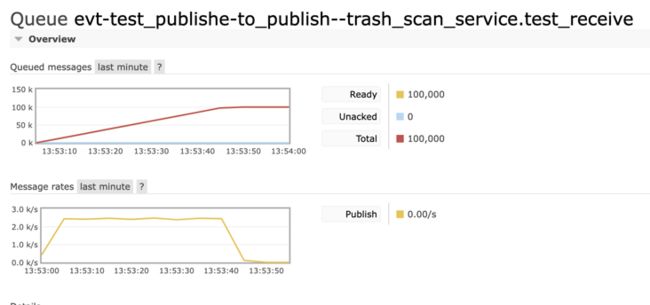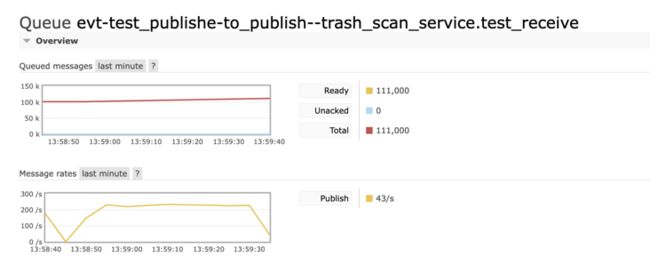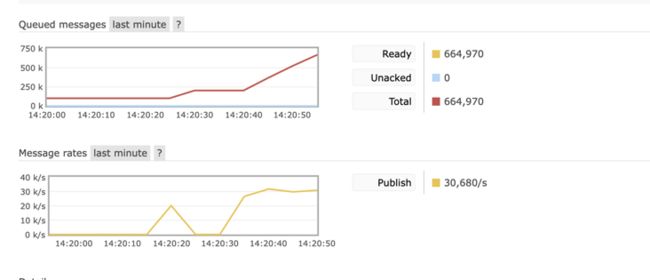将 delivery_mode=NON_PERSISTENT 设为 0 就好了(NON_PERSISTENT 就是 0)
from loguru import logger
import settings
from nameko.standalone.events import event_dispatcher
from nameko.constants import NON_PERSISTENT
import time
config = {
'AMQP_URI': f'amqp://{settings.RABBITMQ_CONFIG.username}:'
f'{settings.RABBITMQ_CONFIG.password}@{settings.RABBITMQ_CONFIG.host}:'
f'{settings.RABBITMQ_CONFIG.port}/{settings.RABBITMQ_CONFIG.vhost}'
}
dispatch = event_dispatcher(config,delivery_mode=NON_PERSISTENT)
for _ in range(100000):
dispatch(
'test_publishe',
'to_publish',
'1234567890'
)message 不持久化,push 速率就可以到 2.5k/s
上图是我在 macbook 上通过 wifi push 到服务器的,延迟如下:
PING 192.168.31.245 (192.168.31.245): 56 data bytes 64 bytes from 192.168.31.245: icmp_seq=0 ttl=64 time=4.563 ms 64 bytes from 192.168.31.245: icmp_seq=1 ttl=64 time=4.206 ms 64 bytes from 192.168.31.245: icmp_seq=2 ttl=64 time=3.787 ms 64 bytes from 192.168.31.245: icmp_seq=3 ttl=64 time=3.741 ms 64 bytes from 192.168.31.245: icmp_seq=4 ttl=64 time=4.791 ms 64 bytes from 192.168.31.245: icmp_seq=5 ttl=64 time=4.327 ms 64 bytes from 192.168.31.245: icmp_seq=6 ttl=64 time=3.905 ms 64 bytes from 192.168.31.245: icmp_seq=7 ttl=64 time=4.072 ms 64 bytes from 192.168.31.245: icmp_seq=8 ttl=64 time=4.170 ms 64 bytes from 192.168.31.245: icmp_seq=9 ttl=64 time=4.190 ms 64 bytes from 192.168.31.245: icmp_seq=10 ttl=64 time=10.588 ms 64 bytes from 192.168.31.245: icmp_seq=11 ttl=64 time=4.108 ms ^C --- 192.168.31.245 ping statistics --- 12 packets transmitted, 12 packets received, 0.0% packet loss round-trip min/avg/max/stddev = 3.741/4.704/10.588/1.797 ms
那如果开启消息持久化呢?速率可以到多少?
使用 delivery_mode=PERSISTENT
可以看到,速率在 200 出头
服务器的硬盘是 SSD 三星 pm981
但是我很奇怪,难道 rabbitmq 就这么一点吞吐量?
然后我用 kombu 裸写了一个生产者
from vine.promises import promise
from kombu import Exchange, Queue
from kombu import Connection
from kombu.messaging import Producer
from kombu.transport.base import Message
from kombu import Exchange, Queue
from loguru import logger
import time
amqp_uri = 'amqp://pon:[email protected]:5672//'
def declare_exchange(exchange: Exchange):
with Connection(amqp_uri) as conn:
with conn.channel() as channel:
exchange.declare(channel=channel)
def declare_queue(queue: Queue):
with Connection(amqp_uri) as conn:
with conn.channel() as channel:
queue.declare(channel=channel)
imdb_exchange = Exchange('imdb', type='fanout')
declare_exchange(exchange=imdb_exchange)
imdb_queue = Queue('imdb_refresh', imdb_exchange,
routing_key='to_refresh', durable=True)
declare_queue(queue=imdb_queue)
with Connection(amqp_uri) as conn:
with conn.channel() as channel:
started_at = time.time()
message = Message(channel=channel, body='123456789')
producer = Producer(
channel,
exchange=imdb_exchange
)
for _ in range(1000000):
res = producer.publish(
body=message.body,
routing_key='to_refresh',
headers=message.headers
)
ended_at = time.time()
logger.debug(f'pay time {ended_at-started_at} s')
# logger.debug(res)如图:
差距有点大这都 3w/s 了!

